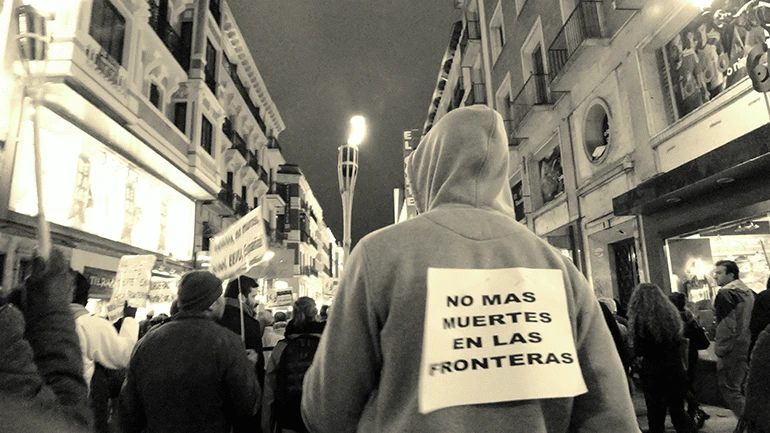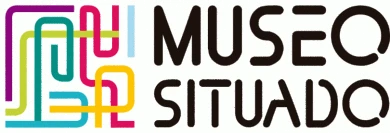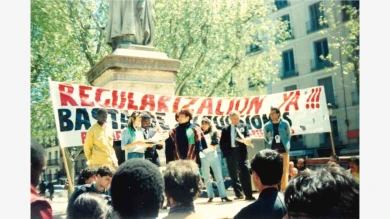-
From 6pm to 9pm / Nouvel Building, Auditoriums Lobby
Photographic exhibition
Multiple Borders. Disobedience and Common Struggles
María Sierra Carretero (Carre) and Red Interlavapiés
This show denotes an exercise which revolves around the graphic memory of certain actions propelled by residents in Madrid’s Lavapiés neighbourhood and their resistance to the multiple borders erected between us. Borders of a European fortress, safeguarding privileges at the expense of the rights of others. Borders in the form of killing fences and the denial of aid, turning the Mediterranean into a deplorable grave. Borders in the access to basic rights, such as healthcare, through unjust laws and bureaucratic obstacles which become real invisible concertina wires, or through difficulties to regulate the administrative status of thousands of migrants locked up in Foreigner Internment Centres (CIES) or doomed to invisibility. Borders in the form of the harassment and persecution of street vendors and traders, criminalising their only source of income within the system. Borders in religion-related prejudice, swinging between the fear of difference and the simplified association between Islam and violence.
The images compiled in the show conflate to form the cry of bodies marked by injustice, ill-treatment and exclusion; bodies that transform the burden of precariousness and inequality to defend, together, their dignity and question consciences, turning vulnerability into a strength. It is no accident that these photographs are largely street images — scenes of diversity. Thus, the importance placed on this common, shared space looks to give the streets back to their real owners: the people that inhabit them.
More importantly, Multiple Borders is a proposal: to collectively build a way of life without waging war against the other and without stigmatising difference, thereby building a world of possibilities for each and every one of us. Equally, it decries – surviving is not a crime – and affirms: co-existence in diversity is both possible and engenders more inclusive ways of life.
Red Interlavapiés
-
6:30pm / Nouvel Building, Auditorium 200
Screening
Gaza
Gaza (Spain, 2018, colour, original version with Spanish subtitles, 18’)
A screening of the short documentary directed by Carles Bover and Julio Pérez del Campo.
Winner of the Goya Award for Best Short Documentary, 2019.
-
7pm / Nouvel Building, Auditorium 200
Round-table discussion
With the participation Patricia Fernandez Vicens, Roberta Ferruti, Helena Maleno and Julio Pérez del Campo. Moderated by Ana Longoni.

Held on 24 Jun 2019
This eighth edition of Situated Voices, promoted by the Museo Situado network, an initiative in which different migrant collectives and neighbourhood associations from Madrid’s Lavapiés neighbourhood collaborate with the Museo Reina Sofía, reflects on the borders which obstruct crossings and refuge for people in the contemporary world. A world that pronounces itself global yet guards access with visible and invisible borders, both material and symbolic. By way of the photographic exhibition Multiple Borders. Disobedience and Common Struggles, the screening of the short documentary film Gaza and a round-table discussion, the session calls for a consideration of different tactics to resist or permeate frontiers: daily survival in the Gaza Strip, experiences of welcoming refugees, for instance the scheme implemented by the Italian municipality of Riace, and the critical situation in Morocco, where thousands of people are detained and criminalised over their attempts to reach Europe.
Framework
Situated Voices
Organised by
Museo Reina Sofía

Participants
María Sierra Carretero (Carre) is a self-taught photographer and a member of Red Interlavapiés. Through her experience travelling to Spain’s southern border, she has felt the need to convey, through the camera, that another world is not only possible; it is essential.
Patricia Fernández Vicens is a “lawyer in the trenches”, and an activist with expertise in “stretching the law” to protect everyone, regardless of race, status and origin. She works as a lawyer for the La Merced-Migraciones Foundation and is a legal Neighbourhood Coordinator in Parroquia de Entrevías, San Carlos Borromeo. She was one of the lawyers in the Tarajal case, in 2014, and has worked in the defence of activist Helena Maleno.
Roberta Ferruti is an independent journalist. She worked to promote the first Solidarity Purchase Groups (GAS in its Italian acronym) in the Italian province of Lacio, from the Università Verde dei Castelli Romani, Rome, and collaborated in the emergence of the first draft bills for biological agriculture in Italy. In 2016 she embarked upon a long journey around the immigration routes of southern Italy, ending up in Riace. Since 2017 she has worked in the Solidarity Network of Commons (RECOSOL in its Italian acronym).
Helena Maleno is a journalist, writer and researcher. A specialist in migration and human trafficking, she is the founder of the collective Caminando Fronteras (Walking Borders). Since 2001 she has lived in Morocco, reporting human rights violations on the border with Spain and working to support and empower sub-Saharan migrant communities in the migration process. On her social media accounts, she warns of migrant boats adrift and the fence jumps that occur, coordinating rescues and safeguarding people’s basic rights.
Julio Pérez del Campo holds degrees in Environmental Protection from the University of Ireland (2004) and Environmental Science from the Rey Juan Carlos University. He has directed and produced, with Carles Bover, the feature-length documentary Gas the Arabs (2017) and the short documentary Gaza (2018) on the situation in the Gaza Strip after the Israeli bombing in the summer of 2014.
Red Interlavapiés is a network of people united against borders and precariousness. Based in Madrid’s Lavapiés neighbourhood, it is made up of people and collectives that fight for people’s free movement, the right to migrate and those aspiring to a society in which no human being is illegal. The network presents itself as “a diverse network made up of local and migrant people, with or without documents, who feel the urgent need to act against ever-increasing brutal and racist forms of injustice that criminalise poverty and migration and deny human and social rights”.
Más actividades

Difficulty. Forms and Political Effects of Deviation in Writing and Contemporary Art
23 February – 14 December 2026 – Check programme
Difficulty. Forms and Political Effects of Deviation in Writing and Contemporary Art is a study group aligned towards thinking about how certain contemporary artistic and cultural practices resist the referentiality that dominates the logics of production and the consumption of present-day art. At the centre of this proposal are the concepts of difficulty and deviation, under which it brings together any procedure capable of preventing artistic forms from being absorbed by a meaning that appears previous to and independent from its expression. By ensuring the perceptibility of their languages, difficulty invites us to think of meaning as the effect of a signifying tension; that is, as a productive and creative activity which, from the materiality of art objects, frees aesthetic experience from the representational mandate and those who participate in it from the passiveness associated with tasks of mimesis and decoding.
The economy of the referential norm translates the social logic of capitalism, where insidious forms of capturing subjectivity and meaning operate. In the early 1980s, and adopting a Marxist framework, poet Ron Silliman highlighted how this logic entailed separating language from any mark, gesture, script, form or syntax that might link it to the conditions of its production, rendering it fetichised (as if without a subject) and alienating its users in a use for which they are not responsible. This double dispossession encodes the political strategy of referential objectivity: with no subject and no trace of its own consistency, language is merely an object, that reality in which it disappears.
The political uses of referentiality, more sophisticated today than ever before, sustain the neoliberal-extractivist phase of capitalism that crosses through present-day societies politically, economically and aesthetically. Against them, fugitive artistic practices emerge which, drawing from Black and Queer studies and other subaltern critical positions, reject the objective limits of what exists, invent forms to name what lies outside what has already been named, and return to subjects the capacity to participate in processes of emission and interpretation.
Read from the standpoint of artistic work, the objective capture of referentiality may be called transparency. Viewed from a social contract that reproduces inequality in fixed identity positions, transparent in this objectivity are, precisely, the discourses that maintain the status quo of domination. Opposite the inferno of these discourses, this group aims to collectively explore, through deviant or fugitive works, the paradise of language that Monique Wittig encountered in the estranged practices of literature. For the political potency of difficulty — that is, its contribution to the utopia of a free language among equals — depends on making visible, first, its own deviations; from there, the norm that those deviations transgress; and finally, the narrowness of a norm which in no way exhausts the possibilities ofsaying, signifying, referring and producing a world.
From this denouncement of referential alienation, fetishisation and capture, Difficulty. Forms and Political Effects of Deviation in Writing and Contemporary Art turns its attention to the strategies of resistance deployed by contemporary artists and poets. Its interest is directed towards proposals as evidently difficult or evasive as those of Gertrude Stein, Lyn Hejinian, Theresa Hak Kyung Cha, Kameelah Janan Rasheed, Kathy Acker, María Salgado and Ricardo Carreira, and as seemingly simple as those of Fernanda Laguna, Felix Gonzalez Torres and Cecilia Vicuña, among other examples that can be added according to the desires and dynamics of the group.
The ten study group sessions, held between February and December, combine theoretical seminars, work with artworks from the Museo Reina Sofía’s Collections and exhibitions, reading workshops and public programs. All these formats serve as spaces of encounter to think commonly about certain problems of poetics — that is, certain political questions — of contemporary writing and art.
Difficulty. Forms and Political Effects of Deviation in Writing and Contemporary Art inaugurates the research line Goodbye, Representation, through which the Museo Reina Sofía’s Studies Directorship seeks to explore the emergence of contemporary artistic and cultural practices which move away from representation as a dominant aesthetic-political strategy and redirect their attention toward artistic languages that question the tendency to point, name and fix, advocating instead for fugitive aesthetics. Over its three-year duration, this research line materializes in study groups, seminars, screenings and other forms of public programming.

Institutional Decentralisation
Thursday, 21 May 2026 – 5:30pm
This series is organised by equipoMotor, a group of teenagers, young people and older people who have participated in the Museo Reina Sofía’s previous community education projects, and is structured around four themed blocks that pivot on the monstrous.
This fourth and final session centres on films that take the museum away from its axis and make it gaze from the edges. Pieces that work with that which is normally left out: peripheral territories, unpolished aesthetics, clumsy gestures full of intent. Instead of possessing an institutional lustre, here they are rough, precarious and strange in appearance, legitimate forms of making and showing culture. The idea is to think about what happens when central authority is displaced, when the ugly and the uncomfortable are not hidden, when they are recognised as part of the commons. Film that does not seek to be to one’s liking, but to open space and allow other ways of seeing and inhabiting the museum to enter stage.

Intergenerationality
Thursday, 9 April 2026 – 5:30pm
This series is organised by equipoMotor, a group of teenagers, young people and older people who have participated in the Museo Reina Sofía’s previous community education projects, and is structured around four themed blocks that pivot on the monstrous.
The third session gazes at film as a place from which to dismantle the idea of one sole history and one sole time. From a decolonial and queer perspective, it explores films which break the straight line of past-present-future, which mix memories, slow progress and leave space for rhythms which customarily make no room for official accounts. Here the images open cracks through which bodies, voices and affects appear, disrupting archive and questioning who narrates, and from where and for whom. The proposal is at once simple and ambitious: use film to imagine other modes of remembering, belonging and projecting futures we have not yet been able to live.

Remedios Zafra
Thursday March 19, 2026 - 19:00 h
The José Luis Brea Chair, dedicated to reflecting on the image and the epistemology of visuality in contemporary culture, opens its program with an inaugural lecture by essayist and thinker Remedios Zafra.
“That the contemporary antifeminist upsurge is constructed as an anti-intellectual drive is no coincidence; the two feed into one another. To advance a reactionary discourse that defends inequality, it is necessary to challenge gender studies and gender-equality policies, but also to devalue the very foundations of knowledge in which these have been most intensely developed over recent decades—while also undermining their institutional support: universities, art and research centers, and academic culture.
Feminism has been deeply linked to the affirmation of the most committed humanist thought. Periods of enlightenment and moments of transition toward more just social forms—sustained by education—have been when feminist demands have emerged most strongly. Awareness and achievements in equality increase when education plays a leading social role; thus, devaluing intellectual work also contributes to harming feminism, and vice versa, insofar as the bond between knowledge and feminism is not only conceptual and historical, but also intimate and political.
Today, antifeminism is used globally as the symbolic adhesive of far-right movements, in parallel with the devaluation of forms of knowledge emerging from the university and from science—mistreated by hoaxes and disinformation on social networks and through the spectacularization of life mediated by screens. These are consequences bound up with the primacy of a scopic value that for some time has been denigrating thought and positioning what is most seen as what is most valuable within the normalized mediation of technology. This inertia coexists with techno-libertarian proclamations that reactivate a patriarchy that uses the resentment of many men as a seductive and cohesive force to preserve and inflame privileges in the new world as techno-scenario.
This lecture will address this epochal context, delving into the synchronicity of these upsurges through an additional parallel between forms of patriarchal domination and techno-labor domination. A parallel in which feminism and intellectual work are both being harmed, while also sending signals that in both lie emancipatory responses to today’s reactionary turns and the neutralization of critique. This consonance would also speak to how the perverse patriarchal basis that turns women into sustainers of their own subordination finds its equivalent in the encouraged self-exploitation of cultural workers; in the legitimation of affective capital and symbolic capital as sufficient forms of payment; in the blurring of boundaries between life and work and in domestic isolation; or in the pressure to please and comply as an extended patriarchal form—today linked to the feigned enthusiasm of precarious workers, but also to technological adulation. In response to possible resistance and intellectual action, patriarchy has associated feminists with a future foretold as unhappy for them, equating “thought and consciousness” with unhappiness—where these have in fact been (and continue to be) levers of autonomy and emancipation.”
— Remedios Zafra

27th Contemporary Art Conservation Conference
Wednesday, 4, and Thursday, 5 March 2026
The 27th Contemporary Art Conservation Conference, organised by the Museo Reina Sofía’s Department of Conservation and Restoration, with the sponsorship of the Mapfre Foundation, is held on 4 and 5 March 2026. This international encounter sets out to share and debate experience and research, open new channels of study and reflect on conservation and the professional practice of restorers.
This edition will be held with in-person and online attendance formats, occurring simultaneously, via twenty-minute interventions followed by a five-minute Q&A.
